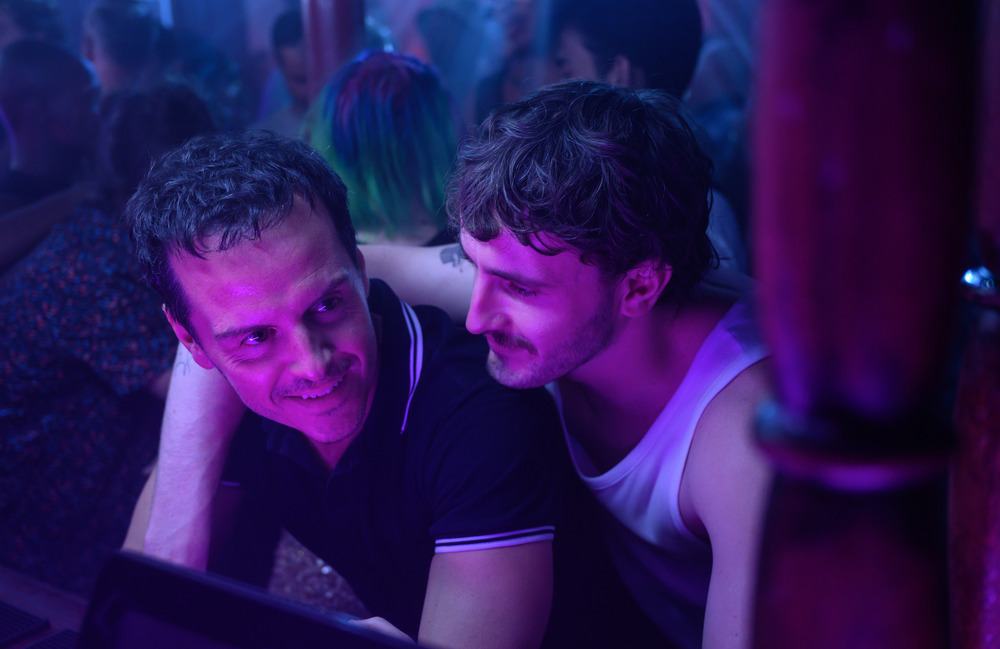Capsule reviews for Dec. 22

Andrew Scott and Paul Mescal star in ALL OF US STRANGERS. (Photo: Searchlight Pictures)
All of Us Strangers
A haunting exploration of memory, acceptance, grief — and most of all, love — this melancholy drama from director Andrew Haigh (45 Years) is bolstered by two fully committed performances. Fledgling screenwriter Adam (Andrew Scott) relocates back to his childhood home, where sparks are triggered with mysterious neighbor Harry (Paul Mescal) as Adam begins having hallucinations involving his late parents from decades earlier, when he was coming out. Harry provides comfort and reassurance amid Adam’s cathartic spiral of self-loathing and grief, which resonates with moviegoers, too. The intimacy feels authentic, and so does the accompanying guilt and regret. The result is quietly powerful without resorting to heavy-handed sentimentality. (Rated R, 105 minutes).
Breakwater
Far-fetched contrivances eventually sink this stylish and mildly intriguing thriller overflowing with bayou atmosphere. It follows Dovey (Darren Mann), a young ex-con who risks breaking parole to do a favor for a fellow inmate (Dermot Mulroney) who he considers a mentor. But after Dovey crosses state lines to connect with a bookstore owner (Alyssa Goss), discovering romantic sparks in the process, dark secrets emerge that change the dynamics and intensify the stakes for everyone involved. Strong performances boost the screenplay by director James Rowe, which initially sidesteps some familiar genre tropes but struggles to generate sufficient emotional investment as the characters confront their troubled pasts. (Rated R, 97 minutes).
The Crime Is Mine
Beneath its screwball surface, this breezy comedy from French director Francois Ozon (Swimming Pool) is an amusing insider takedown of movie studio misogyny, gender politics, and the superficialities of fame. It’s set in 1930s Paris, where struggling actress Madeleine (Nadia Tereszkiewicz) and her lawyer roommate (Rebecca Marder) are strapped for cash. Plus, Madeleine is accused of murder when a lascivious producer winds up dead. But with their backs against the wall, can the duo somehow game the oppressive legal system to their own benefit? With quick-witted dialogue and stylish throwback visuals, the film provides some clever and subversive twists through its beleaguered yet empowered protagonists. (Not rated, 102 minutes).
Freud’s Last Session
Intellectually compelling yet dramatically flat, this uneven adaptation of the acclaimed stage play from director Matthew Brown (The Man Who Knew Infinity) benefits from two standout performances. The fictional story is set in 1939 in London, where an aging Sigmund Freud (Anthony Hopkins) welcomes up-and-coming writer C.S. Lewis (Matthew Goode) — who later wrote the Narnia books — to his study for a spirited debate on religion. Along the way, we learn how tragedies in Freud’s personal life and Lewis’ military service during World War I shaped their belief systems. Some of the intimate exchanges really crackle, although the various subplots and flashbacks are distracting more than illuminating. (Rated PG-13, 108 minutes).
The Teachers’ Lounge
A cautionary tale about how idealism, technology, and social structure create delicate dynamics in contemporary schools, this riveting German drama conveys hope and compassion amid its chaos. Carla (Leonie Benesch) is a rookie teacher at a middle school besieged by rumors of property theft. When she schemes to catch a colleague and provide a harsh lesson, the incident spirals out of control, leading to animosity between Carla and her students, teachers, and parents that leaves the entire school on edge. Despite the film’s frustrating ambiguity with regard to guilt and innocence, Benesch balances resilience and vulnerability in a performance that generates hard-earned sympathy for educators. (Rated PG-13, 98 minutes).